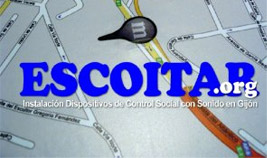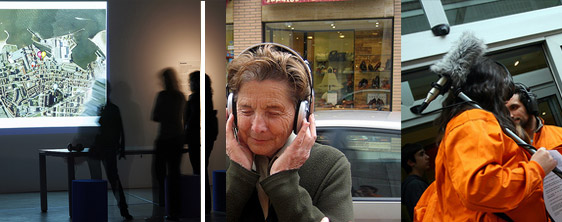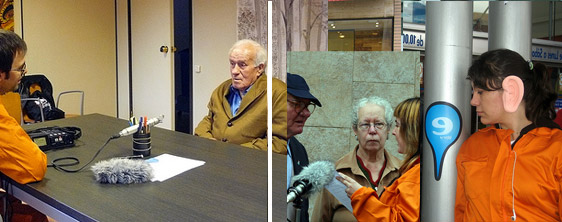

Aire, Sonido, Poder (Air, Sound, Power), 2008
Escoitar
Social Control Technologies with Sound
“Let sounds be themselves”, wrote John Cage, deservedly the most quoted artist. Anthropologist Jacques Maquet claims that “there is a universal aesthetic human response to sound”. Llorenç Barber, another visionary, affirms that “sounds are not only symbols; they are acts” and philosopher Dilthey explained that those strange objects—the sonorous—are creations of the spirit, which “we cannot explain—we can only comprehend”. Hitting the nail on the head, Michel Schneider, the French psychoanalyst and musicologist, says that the sonorous—music— is “ a sort of foreign language that we don’t speak but that speaks to us. It knows things about us that we do not ”. If, in addition to all of this, we consider that the phonograph was invented almost eight centuries after the printing press - that is, a technology that made the preservation, reproduction and distribution of images possible existed long before the corresponding technology for sound- we are faced with an epistomological problem; that is, we are confronted with the need to build a new theory of knowledge that allows for the study of societies through their collective imagination of sound.

An essential role in this new scenario is played by the semantic web, where things are built, not represented: from the figurative level to the pattern, from perspective to immersion, from object to process, from content to context, from reception to negiotiation, from observation to action, and of course, from cerebral autonomism to the distributing mind. It is here, in this new context, where the keys to the solution of the problem may lie, in the terrain covered by Colectivo Escoitar.org.

Image: workshop Escoitar.org under Creative Commons license
Scientific support: Grupo de Investigación DX7 Tracker. Universidad de Vigo.
Thanks to: Ateneo Obrero de La Calzada, Gijón.
- Ciudad Sonora
- The Tailenders
- Amplifier Institute Failures
- Zéppelin 2005
- Listen: Making Sense of Sound
- MOSQUITO
- Favorite Chicago Sounds
- Positive Soundscapes
- Memoryscape
- touch-the-sound
- Proboscis
- Site-hearing
- CRESSON
- HOTS radio
- kalerne
- City in a Soundwalk
- World Soundscape Project
- WFAE
- Soinumapa.net
- Speakerson.net
- Wild Sanctuary
- Sound Transit
- Sound Cities
- TSG
- Far Afield
- Textos y referencias sobre Tecnologías de Control Social con Sonido (armas acústicas)
- Congreso Iberoamericano de Paisaje Sonoro (AA.VV.)
- La música como tortura / La música como arma Suzanne (G. Cusick)
- Textos Ciudad Sonora (AA.VV.)
- Sonoscop (AA.VV.)
- Escoitar.org (AA.VV.)
- Eumus – Proyecto Paisaje Sonoro Uruguay (AA.VV.)
- 1 Textos en World Forum For Acoustic Ecology
- 2 Textos en World Forum For Acoustic Ecology
- Ubu
- archive.org
- freesound
